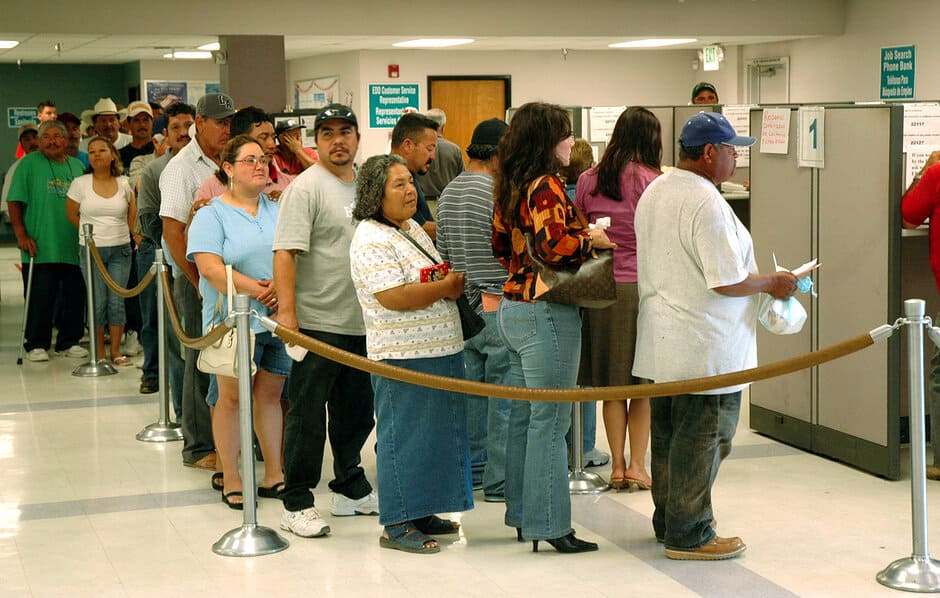
Travis Lavenski is a student at Harvard Law School.
Following two large economic downturns within the last 15 years, the importance of unemployment insurance in supporting those who have lost their jobs cannot be overstated. During the Great Recession, the unemployment system kept millions of working people from plunging into poverty; during the COVID-19 pandemic, the Economic Policy Institute estimated that expanded unemployment benefits “lower[ed] poverty by 7.2 million people” as of June 2020. Despite its importance, there is a massive equity gap in who receives relief. Limited English proficiency (LEP) claimants have historically struggled to receive the unemployment compensation that they rightfully deserve. This is a significant problem, as it is estimated that nearly 1 in 10 American workers is classified as LEP, and industries that are often staffed with LEP workers tend to be disproportionally affected by downturns. Barriers to unemployment benefits for LEP claimants are the result of both the general difficulty involved in applying for unemployment benefits and the explicit failure of many States to provide adequate resources for these populations. This reality is not inevitable. By making LEP access to unemployment benefits a priority, we can ensure equity in access to these important benefits.
Federal Initiatives Have Not Fully Solved LEP Claimants’ Problems
There are existing Federal laws that ostensibly protect LEP claimants’ ability to access unemployment benefits. Most notably, the Supreme Court has held that Title VI of the Civil Rights Act of 1965 forbids entities who are the recipients of federal funds from engaging in language discrimination. This includes unemployment agencies as recipients of FUTA funds. In Lau v. Nichols, 414 U.S. 563 (1974), the Court held that it is discriminatory to not provide “meaningful access” to recipient programs for LEP individuals. President Clinton put the Court’s holding in motion in August, 2000 with Executive Order No. 13166, “Improving Access to Services for Persons with Limited English Proficiency.” EO 14166 requires Federal agencies to ensure their services are meaningfully accessible to LEP claimants. The USDOL, the agency responsible for monitoring, reviewing, and providing assistance to state UI systems, first issued their own policy guidance document guiding states on LEP access to unemployment in 2001. The most recent guidance in May 2020 requires states to take “reasonable steps” to provide free, accurate, and timely language access.
What Barriers Exist for LEP Claimants?
Despite guidance from the Federal Government, the practical reality is that barriers to unemployment still exist for LEP people. There are various reasons for this. To start, applying for unemployment is hard for anyone regardless of English fluency. The process varies by State, but generally, claimants must apply via a written or digital application and interview in person or online with an official from the State’s unemployment agency. In the event a claim is denied, which is the result for a stunningly high number of claims, the claimant has a short window to appeal the decision, which could involve fact-finding inquiries, multiple administrative hearings, and potentially even heading to court. Even in the event a claimant receives their benefits, they might be subjected to work-search requirements, employment substantiation notices, and identity verification. The penalty for noncompliance with these requirements could amount to stoppage of benefits or, sometimes, a demand for claimants to repay the benefits back. Even for fully proficient English speakers, these hurdles can be daunting; for LEP claimants, the hurdles can be impossibly high.
The main problem LEP claimants face that makes applying for benefits even more difficult is a lack of material and personal support from unemployment agencies. According to a March 2020 study conducted by the Peoples’ Parity Project, “[m]any [state websites] fail to provide complete information or access to limited English proficient (LEP) claimants,” and, of those that do, “a significant portion only provide resources for Spanish-speaking people.” Some states have not translated online applications to languages shared by many LEP people within their borders. State-sponsored interpreters, in the event they are provided, may be impossibly hard to come by, undertrained, or unqualified. And even in States that have more robust laws for LEP access to unemployment, advocates note that on-the-ground reality may not measure up to par. In California, for example, a 2021 report found that “claimants who do not speak English face ‘insurmountable barriers’ to receiving benefits.” In New York City, where local laws contain even stricter language access requirements, “many city agencies still failed to provide language services.” These language difficulties might cause an LEP claimant to resort to asking for help from sources not trained in the area of unemployment such as their children or community organizations, turning to already overworked legal services organizations, or simply giving up. Claimants who somehow make it past the initial barriers to benefits might face future correspondence from unemployment agencies in their non-primary language.
Recourse for LEP individuals is more difficult after the Supreme Court weakened Title VI’s impact in Alexander v. Sandoval when it held that private actors do not have the right to sue under Title VI’s disparate impact provisions. Until Sandoval, enforcement of Title VI was shared between Federal agencies, who issued regulations, and private individuals, who could sue if their Title VI rights were violated. Now, the only way to enforce Title VI disparate impact provisions is through filing a complaint with resource-strapped federal agencies, who then might conduct the “resource-intensive method of investigating complaints and enforcing compliance.” Empirical data suggests many LEP individuals do not file complaints. For example, the Department of Health and Human Services received “just 210 language-access complaints” from 2012 to 2017, though undoubtably many more violations of Title VI exist.
What Can Be Done?
Since language barriers to unemployment cannot easily be traced to a single systemic source, it is difficult to provide easy solutions. However, some steps can be taken to mitigate these problems. One obvious solution for providing better access to unemployment is legislative change. If Congress passed a law overturning Sandoval and granted plaintiffs a private right of action for Title VI disparate impact claims, for example, part of the burden of enforcing Title VI could be offloaded from the Federal Government onto private plaintiffs. This would have an impact beyond the unemployment context as, unfortunately, access barriers to Federal services for LEP people are not limited to just unemployment. But with political gridlock in our system, this solution might be difficult to implement.
A non-legislative solution would be for Federal agencies to be more specific when crafting policy guidance. Current policy guidances typically leave considerable room for states to ensure meaningful access to services, and merely direct them to consider certain factors such as LEP population, frequency of LEP contact with the program in question, the importance of the program, and cost. The vague nature of these guidances can lead to holes in access. Federal agencies sending proactive messages to states regarding language access requirements can mitigate this problem and ensure certain baseline measures are in place. Some considerations for concrete requirements could include requiring proactive identification of a claimant’s language, a required minimum number of multilingual phone lines, and requiring websites/boilerplate documents to be translated to a language if it is spoken by a specific proportion of the population.
And finally, it is probable that more investment in the USDOL will indirectly impact LEP claimants as well. In one sense, difficulties for LEP claimants in receiving UI funds is merely a symptom of a greater disease. Decades of decreasing federal resources has led to weaker oversight of states’ administration of unemployment agencies. This lack of priority for UI administration has allowed for some states to administer lackluster programs to all of its workers, not just those with limited English proficiency. Equipping the USDOL with the ability to robustly monitor, review, and assist states with their unemployment systems would likely enhance the ability for LEP claimants to benefit from these programs.
Despite attempts by advocacy groups and various agencies to address the needs of LEP claimants in accessing unemployment, the reality is that LEP communities still face significant hurdles in receiving benefits. Perhaps it is difficult to fully resolve these issues, especially without legislative change, but these proposals provide one route towards more language access for LEP populations.










Daily News & Commentary
Start your day with our roundup of the latest labor developments. See all
April 24
Workers in Montreal organize the first Amazon warehouse union in Canada and Fordham Graduate Student Workers reach a tentative agreement with the university.
April 23
Supreme Court hears cases about 10(j) injunctions and forced arbitration; workers increasingly strike before earning first union contract
April 22
DOL and EEOC beat the buzzer; Striking journalists get big NLRB news
April 21
Historic unionization at Volkswagen's Chattanooga plant; DOL cracks down on child labor; NY passes tax credit for journalists' salaries.
April 19
Alabama and Louisiana advance anti-worker legislation; Mercedes workers in Alabama set election date; VW Chattanooga election concludes today.
April 18
Disneyland performers file petition for unionization and union elections begin at Volkswagen plant in Tennessee.